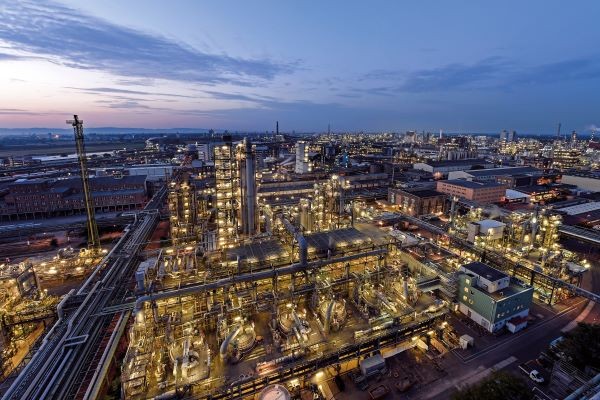First commercial scale production of bio-based 2-Octyl Acrylate

BASF's Verbund site, Ludwigshafen
BASF is expanding its growing portfolio of 14C bio-based monomers with a proprietary process for production of 2-Octyl Acrylate (2-OA). The new product underlines BASF’s strong commitment to innovation for a sustainable future with 73% 14C-tracable bio-based content according to ISO 16620.
Besides the regular 14C bio-based 2-Octyl Acrylate, BASF also launched the new product as 2-Octyl Acrylate BMB ISCC Plus. Here, the remaining carbon content is ISCC PLUS certified, and by applying BASF’s biomass balance (BMB1) approach, this variant offers a further reduced product carbon footprint (PCF2).
With an industrial-scale production setup at its Verbund site in Ludwigshafen, Germany, BASF has a pioneering role when it comes to producing 2-Octyl Acrylate in large volumes. This allows BASF to make the bio-based monomer globally available as a raw material.
“We have broadened our product portfolio to support customers on their sustainability journey. With 2-OA, we are proud to have launched a novel acrylic monomer that helps customers to meet their sustainability goals," says Dr. Reiner Geier, Senior Vice President Industrial Petrochemicals Europe.
BASF’s 2-Octyl Acrylate uses 2-Octanol as the respective bio-based feedstock. This bio-alcohol is based on castor oil, a sustainable non-edible feedstock which is reliably available throughout the year.
With its balanced solvency, 2-Octyl Acrylate can easily be used as bio-based alternative to fossil-based monomers such as 2-Ethylhexyl Acrylate (2-EHA) and n-Butyl Acrylate (BA) e.g. in adhesives formulations, or coatings applications.
BASF’s 2-Octyl Acrylate is already registered in the EU, the US, Japan and many other countries. Further registrations are ongoing.
Subscribe to our newsletter & stay updated.